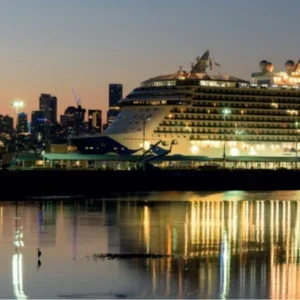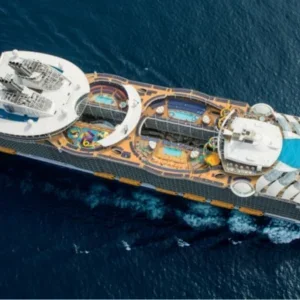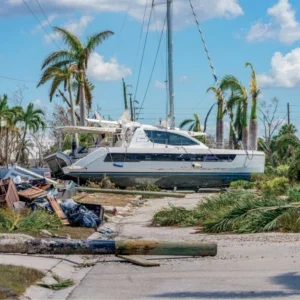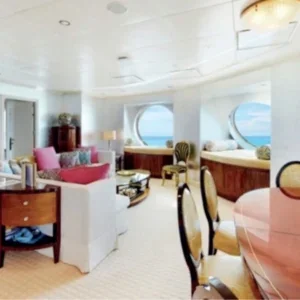On 20 May, three days after the UK government gave the green light for domestic cruising, the new MSC Virtuosa set sail from Southampton. Judged by MSC Cruises’ usual standards, the ship’s maiden voyage perhaps didn’t make too much of a splash. It hosted just 1,000 passengers, despite having capacity for 6,200, and its itinerary consisted of a four-day round trip via the Isle of Portland in Dorset.
Nonetheless, this was a benchmark moment both for MSC Cruises, and for the UK cruise industry in general. MSC Virtuosa was the first cruise ship since the start of the pandemic to set sail from UK waters, marking the end of a 14-month standstill.
“We are incredibly proud that MSC Virtuosa’s first ever sailing heralds the resumption of cruise holidays from British ports and we would like to thank the UK government and other local authorities for their support to us, and the overall cruise industry to allow domestic cruising to restart,” said Gianni Onorato, CEO of MSC Cruises.
Two days later, the Viking Venus embarked from Portsmouth on its inaugural voyage. Marella Cruises and P&O Cruises resumed travel in June, with many others following suit as the summer wore on. By August, there were 18 cruise lines operating 23 ships with itineraries around the British coastline, marking the busiest summer of cruising Britain had ever seen.
Operators say that demand has been high, with passengers keen to resume an activity denied to them for well over a year.
“Sales have been strong since we announced our domestic return to sailing in the UK, with people eager to get back out there and seek out new experiences again,” says Ben Bouldin, vice president EMEA at Royal Caribbean. “After a year of staying home, paired with missing out on moments and occasions with family, friends and loved ones, we are seeing and feeling tremendous hope and optimism.”
Great British getaway
Royal Caribbean restarted domestic cruising on 7 July, with a series of four to seven-night sailings, dubbed ‘Ocean Getaways’, on board the Anthem of the Seas. Ports of call have included Liverpool, Belfast, Kirkwall and Glasgow, and guest satisfaction scores, says Bouldin, have been consistently high.
“We have recently announced the extension of our British Isles sailings through October 2021 following the great response from our UK guests and the complexities that we still need to navigate with international cruising,” he says. “CLIA estimates that the cruise sector contributes £10bn to the UK economy every year and we expect this figure to grow in the future as more people discover the joys of cruising from the UK.”
It is a similar story at Saga Cruises, which has been offering a number of British itineraries aboard its two ships, Spirit of Discovery and Spirit of Adventure. The latter embarked on its maiden voyage on 26 July, following a naming ceremony scheduled to coincide with ‘Freedom Day’ (the ending of most Covid-19 restrictions in the UK).
“Our itineraries around the UK have been extremely popular, with almost all departures sold out and we have shown places that many British guests have not been to, such as the Scilly Isles,” says Nigel Blanks, CEO of Saga Cruises. “Our guests have told us how much they enjoy the smaller, more boutique cruising experience we offer, and the ‘always inclusive’ promise on board.”
The enforced break, he adds, functioned as a time to recoup and reset, particularly when it came to the food, beverage and entertainment options that Saga Cruises has on board.
Satisfaction on the menu
“We have reviewed all of our menus, adding new choices and dishes that our customers are already telling us they love,” he says. “We also took delivery of our second new ship Spirit of Adventure, allowing us time to get to know the ship and prepare her for her inaugural season. Spirit of Adventure is a sister ship to Discovery but she is more modern and contemporary than her sister.”
While many cruise lines used the break productively, it doesn’t take much probing to see how detrimental this time really was. Cruise lines incurred huge losses throughout the pandemic – according to the credit agency Moody’s, the likes of Carnival, Royal Caribbean and Norwegian Cruise Line each lost nearly $900m a month. The easing of restrictions, and the opportunity to resume sailings, is a boon to operators across the board.
The big question is whether they can fully rebound against a backdrop of continuing restrictions. To take just one example, Scottish cruise calls were banned until 19 July, forcing a number of operators to change their plans at the eleventh hour.
“After a year of staying home, paired with missing out on moments and occasions with family, friends and loved ones, we are seeing and feeling tremendous hope and optimism.”
Ben Bouldin
$900m
The amount cruise lines, such as Carnival, Royal Caribbean and Norwegian Cruise Line, lost per month throughout the pandemic.
Moody’s
Worse, the threat of a Covid-19 outbreak still looms large. While there were no reported outbreaks on British ships this summer, Cunard’s Queen Elizabeth cancelled its first planned sailing after a number of crew members tested positive. And every ship has needed to implement capacity restrictions and Covid mitigation measures.
“We have reduced capacity aboard, enhanced air conditioning which supplies 100% fresh air to cabins and public areas, and a double medical team and dedicated isolation area,” says Blanks. “The measures we have put in place go above and beyond the guidance from the UK Chamber of Shipping, which has been agreed by public health experts and the government.”
Sanitised hands on deck
The guidance in question, first published in October 2020, makes recommendations around passenger screening, ventilation, disinfection and so forth.
Additionally, the Foreign, Commonwealth & Development Office (FCDO) advises that ships must not operate beyond a 50% capacity, and that they should have a vaccination policy in place. Most, though not all, operators require guests to be fully jabbed (meaning they have received their second dose of vaccine at least 14 days before embarking).
“For sailings from the UK, our guests aged 18 and over must present proof of full Covid-19 vaccination, while those younger than the eligible age must undergo testing,” says Bouldin. “The vaccine policy is one of the cruise line’s multilayered measures that safeguard the wellbeing of all guests, crew members and the communities at each port of call.”
Insofar as they can fully control their environment, cruise ships may actually have an epidemiological advantage over other forms of hospitality, at least while the guests are on board.
What they do about shoreside excursions remains a stickier question. P&O Cruises found one solution with its ‘voyages to nowhere’ – three and four-night sailings without any stop-offs at all. “We will aim to take our ships where it is warm and sunny," affirmed P&O Cruises president Paul Ludlow, in an ominous-sounding statement to those familiar with the unpredictable bursts of wind and rain that can dampen British coastal areas.
“All excursions take place in a bubble, and involve either scenic coach tours of a destination or venue tours where the venue is closed to the wider public to ensure guests do not mix with anyone external to the ship.”
Nigel Blanks
50%
The capacity at which ships are told to operate, even with a vaccination policy in place. Most operators require guests to be fully jabbed.
FCDO
Other operators are doing what they can to minimise contagion: “All excursions take place in a bubble, and involve either scenic coach tours of a destination or venue tours where the venue is closed to the wider public to ensure guests do not mix with anyone external to the ship,” says Blanks.
Embracing local shores
Despite the challenging ‘new normal’ in which cruise lines are required to operate, they are keen to stress that the cruise experience is not diminished by these new protocols. As Bouldin explains, Royal Caribbean worked hard to ensure Covid-19 measures do not have a negative impact on guests’ holidays. “Many of them, such as the newly developed app, have been designed not just to support Covid health and safety protocols, but to make the cruise experience more enjoyable,” he says. “Health and safety remains a high priority but there is no doubt our cruises offer guests the ideal mix of chills and thrills thanks to our spectacular on board activities, restaurants and entertainment.”
After all, Covid protocols may seem like a small price to pay if you haven’t been on holiday for two years. What’s more, with foreign holiday still so admin-intensive, domestic cruising likely gained a new allure. There is some suggestion that guest demographics may have changed throughout this period, with a higher proportion of first-time cruisers who wanted to make the most of their ‘staycation’.
Given the unique circumstances in which it arose, domestic cruising is unlikely to continue this momentum. International cruises resumed from England on 2 August, and both Bouldin and Blanks expect their guests will be excited to explore beyond Britain’s shores. However, it’s also a safe bet that the summer’s more local itineraries won’t be easily forgotten.
“As the only British-owned, British-flagged cruise operator, we’re proud to be able to offer our guests a unique experience on board our two brand new ships,” says Blanks. “I cannot wait to see what the future holds for what I’m sure will be an exciting new chapter for both Saga and the UK cruise industry as a whole.”
With opportunities to venture abroad now few and far between – and staying closer to home deemed by many to be a more sensible option than heading overseas – there is no denying that Covid-19 has shifted the spotlight towards British domestic cruising. While the North Atlantic might not always make for blue sky sailing and sun-kissed adventures, it has a rugged beauty that is all too often overlooked.






